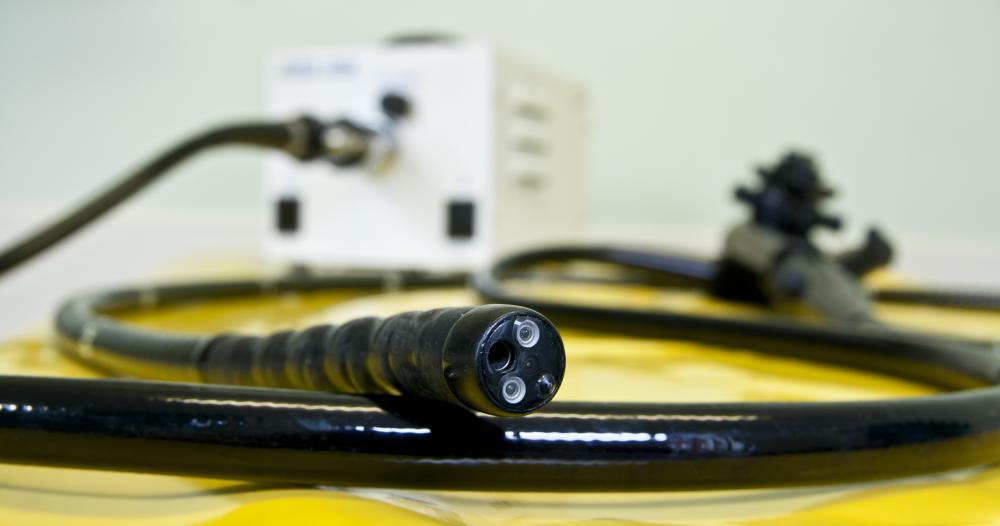At WiseGEEK, we're committed to delivering accurate, trustworthy information. Our expert-authored content is rigorously fact-checked and sourced from credible authorities. Discover how we uphold the highest standards in providing you with reliable knowledge.
Do I Need a Colonoscopy?
The question of whether or not a patient needs a colonoscopy depends on a number of factors. This medical procedure involves looking into the intestinal tract with a rectally-inserted camera, and it is performed to look for signs of polyps, lesions, and other health problems in the colon. While getting a colonoscopy can be uncomfortable, this test can be critically useful in identifying the early signs of colon cancer and other health conditions.
As a general rule, if a patient is over age 50, he or she will need a colonoscopy every 10 years until the age of 75 or 80, since the biggest risk factor for colon cancer is age. A virtual colonoscopy, which involves using medical imaging equipment to get a picture of the colon, can also be used, along with tests of feces to look for signs of bleeding and ulceration in the colon.

If a patient has a family history of cancer, he or she will need a colonoscopy more frequently, due to the increased risk of cancer. Cancer in close family members is an indicator for a colonoscopy every five years starting at age 40, and a high incidence of cancer, especially colon cancer, in the family history would suggest that a patient may need a colonoscopy every three years starting at an age 10 years below that of the youngest family member diagnosed with cancer. In other words, if a patient's father was diagnosed with colon cancer at age 35, the patient should plan on getting a colonoscopy at age 25 and every three years thereafter.

A patient may also need a colonoscopy if he or she has a history of colon polyps or bowel disease. A doctor will make recommendations based on the individual patient's condition, but routine screening may need to start as young as age 15, with follow up screenings between two and five years, depending on the patient's circumstances. People with a history of familial adenomatous polyposis, Crohn's disease, irritable bowel disease, and other bowel conditions may need a colonoscopy on a regular basis to check for early signs of a problem.

Beyond the basic colonoscopy recommendations used as rough guidelines in patient care, there may be specific circumstances in which a doctor recommends a colonoscopy as part of a diagnosis and treatment plan. When a doctor requests that a patient get a colonoscopy, it is a good idea to follow the recommendation. If the patient has recently received a colonoscopy screening, he or she can ask if the doctor can review the earlier results and withdraw the recommendation for a repeat, but the doctor may feel that the patient's condition merits a second look into the intestines.
AS FEATURED ON:
AS FEATURED ON:















Discussion Comments
Considering the "down time" for prep the day before, the day of the procedure, and possibly the day after to fully recover, how about first a FOBT to see if there is a need for the procedure (assuming there are no symptoms or risk factors)? If needed, then the colonoscopy would be worth the risks, time and cost.
I do not have a job where I am free to run to the bathroom frequently, and prefer to save my limited sick days to when I am actually sick. I'd rather not use sick days for a screening to look for problems for which I have no symptoms, no risk factors and no family history. Again, if a (risk-free, complication-free and low cost) FOBT indicated something questionable, then by all means a follow-up colonoscopy would be worthwhile.
Nobody wants to have a colonoscopy done or looks forward to one. As I get closer to that 50 mark, my doctor keeps telling me I will need to get one scheduled. I know several people who have had them done and I have asked them how they go about preparing for a colonoscopy.
Most have said that it really is not as bad as some people make them out to be. The answer I hear over and over again is that the worst part is drinking the liquid the day before. I figure if I know this going into it I at least know what to expect.
Putting off having a colonoscopy is a very easy thing to do, especially if you are not having any symptoms. But colon cancer is one that is very treatable if it is caught early. Everyone is recommended to have one when they are 50, or sooner if there is any kind of family history.
I look at having a colonoscopy done as a gift to yourself and your family. This can give you and them some peace of mind and should be covered under most insurance plans so you are not out too much money to have this done.
If your colonoscopy reveals polyps in your colon, they will usually get rid of them at the time, but then you will need to be re-tested more frequently. Polyps are something to watch carefully as they can lead to more serious disease.
Post your comments